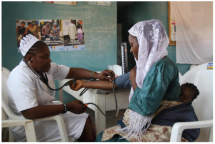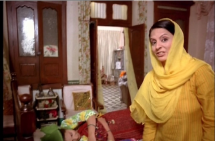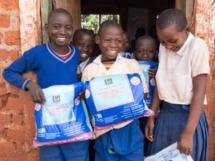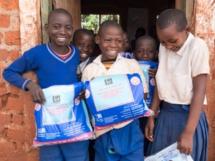GoodLife TV Spot: Kama Sutra
In June 2011 BCS and ProMPT, in partnership with the National Malaria Control Programme and the Ghana Health Service, launched the new “Aha ye de” malaria campaign. “Aha ye de” means “It’s Good Here” in Twi, one of Ghana’s national languages. The campaign is designed to reposition the use of treated nets as a lifestyle decision, while at the same time preventing malaria, linking to the BCS’s overarching GoodLife campaign.
In June 2011 BCS and ProMPT, in partnership with the National Malaria Control Programme and the Ghana Health Service, launched the new “Aha ye de” malaria campaign. “Aha ye de” means “It’s Good Here” in Twi, one of Ghana’s national languages. The campaign is designed to reposition the use of treated nets as a lifestyle decision, while at the same time preventing malaria, linking the BCS’s overarching GoodLife campaign. The campaign seeks to increase risk perception by emphasizing the severity and threats of malaria. At the same time, the campaign empowers individuals to use malaria prevention and appropriate treatment.
This one minute TV spot shows a couple getting ready to have sex, but the woman is continually bothered by the mosquitos in the room. At the end of the spot we see the couple preparing their bed with a treated net, and the woman and man much happier. The video is available in English and Twi.
In June 2011 BCS and ProMPT, in partnership with the National Malaria Control Programme and the Ghana Health Service, launched the new “Aha ye de” malaria campaign. “Aha ye de” means “It’s Good Here” in Twi, one of Ghana’s national languages. The campaign is designed to reposition the use of treated nets as a lifestyle decision, while at the same time preventing malaria, linking to the BCS’s overarching GoodLife campaign. – See more at: /project-examples/aha-ye-de-always-sleep-under-treated-net-0#sthash.ZvdSYpDh.dpuf
In June 2011 BCS and ProMPT, in partnership with the National Malaria Control Programme and the Ghana Health Service, launched the new “Aha ye de” malaria campaign. “Aha ye de” means “It’s Good Here” in Twi, one of Ghana’s national languages. The campaign is designed to reposition the use of treated nets as a lifestyle decision, while at the same time preventing malaria, linking to the BCS’s overarching GoodLife campaign. – See more at: /project-examples/aha-ye-de-always-sleep-under-treated-net-0#sthash.ZvdSYpDh.dpufIn June 2011 BCS and ProMPT, in partnership with the National Malaria Control Programme and the Ghana Health Service, launched the new “Aha ye de” malaria campaign. “Aha ye de” means “It’s Good Here” in Twi, one of Ghana’s national languages. The campaign is designed to reposition the use of treated nets as a lifestyle decision, while at the same time preventing malaria, linking to the BCS’s overarching GoodLife campaign. – See more at: /project-examples/aha-ye-de-always-sleep-under-treated-net-0#sthash.ZvdSYpDh.dpuf
Source: Johns Hopkins University Center for Communication Programs, Family Health Division of the Ghana Health Service
Date of Publication: March 25, 2019










